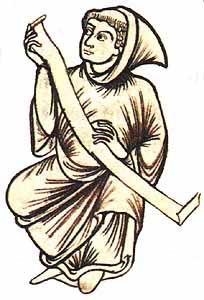
EBK Home
Kingdoms
Royalty
Saints
Pedigrees
Archaeology
King Arthur
Mail David
 St. Aelred,
St. Aelred,Abbot of Rievaulx
(1110-1167)
Aelred was the son of a priest of Hexham. Of noble descent, he was born in that region of Northern England in 1110. Being educated in learning and piety at Durham, around 1130, he was invited by St. David, the pious King of Scotland, to his court, made seneschal of his household and was highly esteemed both by him and the courtiers. His virtue shone with bright lustre in the World, particularly his meekness, as related in a number of anecdotes.
A certain person of quality, having insulted and reproached him in the presence of the King, Aelred heard him out with patience and thanked him for his charity and sincerity in telling him his faults. This behaviour had such an influence on his adversary that it made him ask his pardon on the spot. Another time, whilst he was speaking on a certain matter, one interrupted him with very harsh reviling expressions. Aelred heard him with tranquility and, afterward, resumed his discourse with the same calmness and presence of mind as before.
He desired ardently to devote himself entirely to God, by forsaking the World - but the charms of friendship detained him some time longer in it. Reflecting that he must, sooner or later, be separated, by death, from those he loved most, he condemned his own cowardice and broke, at once, those bonds of friendship which were more agreeable to him than all other sweets of life. To relinquish entirely all his Worldly engagements, he left Scotland, and embraced the austere Cistercian order, at Rievaulx in Yorkshire, where Walter de L'Espeque had recently (1122) founded a monastery.
At the age of twenty-four, in 1134, he became a monk under the first abbot, William, a disciple of St. Bernard. In spite of the delicacy of his body, he set himself cheerfully to practice the greatest austerities and employed much of his time in prayer and reading. His heart turned with great ardour to the love of God and this made him feel all the Cistercian disciplines as sweetness and light. He had been much delighted, in his youth, with reading Cicero; but, after his conversion, found that author and all others, tedi-ous and bitter, unless they wrote of the word of God. This he records in the preface to his book 'On Spiritual Friendship'.
Aelred was much edified with the very looks of a holy monk, called Simon, who had rejected his high birth, an ample fortune and all the advantages of mind and body, to serve God in that penitential state. This monk acted as one deaf and dumb, constantly recollecting in God. He was such a lover of silence that he would scarce speak a few words to the prior on necessary occasions. His silence however was sweet, agreeable and full of edification. Our Saint says of him, "The very sight of his humility stifled my ardour to the love of God and this made him feel all pride, and made me blush at the want of mortification in my looks." This holy monk having served God eight years in perfect fidelity, died in 1142, repeating with his last breath, "I will sing eternally, 0 Lord, thy mercy, thy mercy, thy mercy!"
St. Aelred himself was held in high esteem at Rievaulx and was chosen, in 1142, to travel to Rome as an envoy in the disputed election of William FitzHerbert to the Archiepiscopate of York. Upon his return, he was made master of the novices and, the following year, he was, much against his inclination, made abbot of a new monastery of his order, founded by William, Earl of LincoIn, at Revesby in Lincolnshire. Only four years later, he was recalled to the same position at Rievaulx. The house prospered under his rule to such an extent that it became the largest of its time in England. It was home to 150 monks and 500 lay brothers; and five daughter houses were established on both sides of the Northern border. Describing the lives of his brethren, Aelred recorded that they drank nothing but water, ate little, laboured hard, slept little - and on hard boards - never spoke, except to their superiors on necessary occasions, and loved prayer.
Through his friends and his writings, Aelred became a figure of national importance. He was chosen to preach at Westminster Abbey during the translation of St. Edward the Confessor in 1163 and subsequently wrote his well-known life of this man. Other works include a Life of St. Ninian, the Saints of Hexham and Sermons on Isaiah which are often considered his finest.
Towards the end of his life, ill-health forced Aelred to live in a small hut near the infirmary at Rievaulx. He was now rarely able to travel. Though, occasionally, he managed to visit his friend, St. Godric, on his way north to his Scottish foundations. He died at Rievaulx on 12th January 1067 and was buried in the Chapter House. He was never formally canonized, but a local cult, approved by the Cistercians, quickly grew up around him and his body was translated to a superb gold and silver shrine behind the high-altar.
Partly Edited from S. Baring-Gould's "The Lives of the Saints" (1877).
